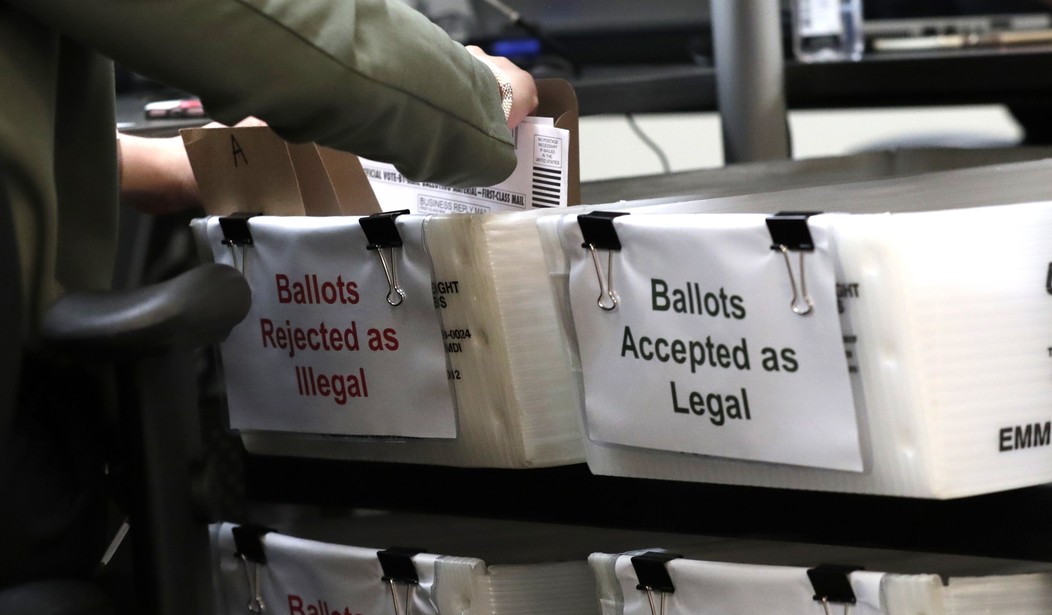Ever since I was a little kid, I looked forward to voting. The political process has always given me a warm feeling. Or it could be hives. One of my personal traditions is that I never tell anyone how I vote, not even my wife. Anyone who knows me well enough can pretty much divine how I voted on a candidate or issue, but I've always valued the idea that a man can vote his conscience at the ballot box without having someone look over his shoulder and the right, if he so chooses, to keep his choice close to his vest.
Of course, at this point, once one casts one's ballot, one really cannot be sure what will happen to it. And over the last few years, voter rolls have been subject to a certain amount of creativity.
And before the progressive trolls begin to grouch about conspiracy theories, let us not forget the wailing and keening about alleged fraud that emanated from the Hilary Clinton and Al Gore campaigns when they suffered defeat. For you younger readers, look up Al Gore and hanging chads to see just how ludicrous a certain election season became once upon a time. And believe me, it was almost laughable. Was it ridiculous? You bet your dimpled chad, it was. And now, voting records are about to become more transparent.
On Monday, the First Circuit Court of Appeals ruled Maine’s voter roll is a public record under the National Voter Registration Act of 1993 (NVRA). The decision came in the case Public Interest Legal Foundation v. Shanna Bellows in her capacity of Secretary of State for the state of Maine.
According to a press release from PILF, the foundation requested access to Maine's voter file and voting histories in 2019. That request was denied on the basis of a state law that limited access to preferred entities, such as political parties. PILF filed a lawsuit in 2020. In response to the suit, Maine changed its state law to allow access to its voter file. But for an organization to do any research the request had to be pre-approved by the state legislature.
PILF smelled a rat. A little digging revealed that the law had been drafted by staffers at the Secretary of State's office, sympathetic state lawmakers, and a lobbyist for the state Democratic Party. Another participant was the Electronic Privacy Information Center which fought against the Presidential Advisory Commission on Election Integrity in 2017 in an attempt to block access to states' voter files for research. PILF amended its complaint to challenge the fines and restrictions under the law.
Related: True the Vote Scores Huge Win for Election Integrity
Here is the court's opinion.
Whether voter registration rolls are accurate and current cannot be determined without inspecting the Voter File…In other words, the evaluation of voter registration rolls would be impossible if the results of Maine’s voter list registration and maintenance activities were not subject to public disclosure. For the above reasons, Maine’s Voter File is a record concerning the implementation of programs and activities conducted for the purpose of ensuring the accuracy and currency of official lists of eligible voters and is thus subject to disclosure under Section 8.
PILF President J. Christian Adams commented:
This is monumental victory for transparency in elections. The use restrictions would have prohibited basic voter roll research and limited PILF’s ability to share its findings with the public. PILF was prohibited from comparing Maine’s and New York’s voter rolls to spot duplicate registrations under the law. Other states should think twice before passing laws that restrict the public from accessing the voter file and speaking about any errors.
PILF won similar cases in Illinois and Maryland. It has another case underway in Hawaii.
One need not think too long or too hard about what the scenario would have been if the situation had been reversed. Democrats would have shrieked like Nazgul that democracy would be at stake if they were rendered unable to access the information. As it stands, I am sure that Maine Democrats shrieked that their Democracy would be threatened.
I value the sanctity of the ballot box, but as a certain organization that continues to labor under the delusion that it supports the First Amendment once said, "Democracy dies in darkness." And one side of the political aisle seems obsessed with spreading the darkness. After all, they have to destroy your freedom in order to save theirs.










Join the conversation as a VIP Member